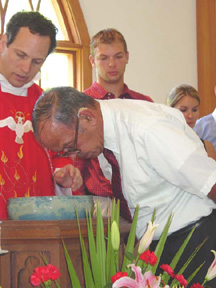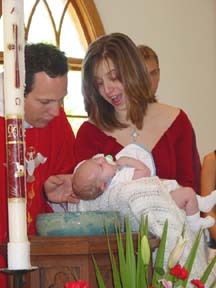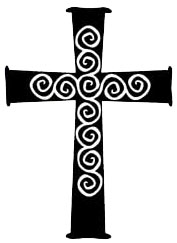|
The Rev. Frank
Logue
Why is Water Wet? Water. It is basic to life. Roughly 70% of the human body is made up of water, while the earth is approximately 80% water. We are surrounded by the wet stuff. Well, not exactly. Water is not really wet. Not wet in and of itself, anyway. As you know, water is defined by the chemical equation H20 for it is two Hydrogen atoms and one Oxygen atom bound in a molecule. Take a few of these molecules of water together and you would not experience them as wet. Even a few hundred molecules would not do the trick. Water is nothing but H20 and those molecules are not inherently “wet.” However, when billions of these bundles of Hydrogen and Oxygen get together, the molecules interact to create tension on the surface which we experience as wetness.[1] Billions of molecules are no problem. Don’t picture an ocean. A single drop of water contains about 10 to the 21st power (1021) molecules of H20. That’s a sextillion, as in million, billion, trillion, quadrillion, quintillion, sextillion. Is anyone tempted to smack me yet? What a polite congregation. Peeling back the layers of reality to see what is under the surface or behind the scenes, is interesting, important even, but beside the point on this fine May morning. If you’re thinking, “We all know water is wet. Move on.” You are probably not alone. Yet as physicist turned Anglican priest, John Polkinghorne,[2] has put it, some people are “nothing butters” when it comes to the world we live in. Reductionists see a thing is nothing but it’s physical explanation. They need only look at the most elemental form of a thing to explain everything. Water is nothing but H20 and the sensation of wetness is nothing but a physical sensation of surface tension created by the interaction of the molecules. For a “nothing butter” the compositions of Bach and Beethoven are nothing but vibrations that interact with our ear drums to create the effect we call music. The Mona Lisa is nothing but flecks of paint which we experience as differing colors. The Pentecost experience was nothing but religious hysteria. Baptism is nothing but water poured over someone’s head. Yes, the Bach and Beethoven’s greatest works do reach our ears as nothing but vibrations against our eardrums, for that is how the beauty of the composers work in transmitted. But you can’t reduce their music to mere vibrations hitting your eardrum. Sure the Mona Lisa is just flecks of matter we call paint on matter we call canvas in ways that we experience as interplay of colors. But her enigmatic smile can not be reduced to the matter which forms the art. So also, the Pentecostal experience, of the Holy Spirit coming to Jesus’ disciples on that 50th day after the Passover, would have created some emotionalism akin to religious hysteria. Yet whatever caused some in the crowd that day to wonder whether the disciples had been drinking was not all there was to the event. We know something more was happening because lives were changed and stayed changed. And we know this because we have seen the Holy Spirit change lives in the here and now and those lives stay changed. Something more than an emotional event is taking place.
And yes welcoming these two Christians into the household of God will be wet. Forget the explanation of water through mere physics. Baptism is meant to be wet. The water is, after all, the outward sign of the inward grace which takes place. On Easter, when we held nine baptisms, the floor around the font got soaked. Even in using a bird bath sized font, we make sure that the water is visible, tangible, real, for water is not accidental to baptism, but essential. We use elemental water to connect with a deeper reality. It was over the primal waters that the Holy Spirit hovered when God created all that is. Water is not just something you need to drink, it is a part of your very body, a major part of the world in which you live. Water is essential for life. Imagine this conversation about water with me:
This is, of course, a story about God. It is our loving God in whom we live and move and have our being. God is so present in all places that we can not see God. God is in the very air we breathe, in our hearts, and in the hearts of all we meet. Experiencing a world without God may well be like a fish experiencing life without an ocean. God created all that is, so we depend on God in that sense. But the creation is ongoing and we continue to count on God to animate and inspire our lives. So while some may look at the physical world and see nothing but the physical world, that does not mean there is not also a spiritual reality. As Teilhard de Chardin put the question, “Are we human beings having a spiritual experience or are we spiritual beings having a human experience?” The answer for me is yes to both. We are spiritual beings who are having a human experience and human beings having a spiritual experience. To reduce our lives to nothing but the merely physical or nothing but the merely spiritual is to miss the richness of the world God created. Pentecost was a wild unleashing of God’s presence in a new and mighty way. The less predictable elements of wind and fire were the only way those present could describe the off-the-hook experience: When the day of Pentecost had come, the disciples were all together in one place. And suddenly from heaven there came a sound like the rush of a violent wind, and it filled the entire house where they were sitting. Divided tongues, as of fire, appeared among them, and a tongue rested on each of them. All of them were filled with the Holy Spirit and began to speak in other languages, as the Spirit gave them ability. A violent wind, tongues of fire. It was an event that defied any “it was nothing but” explanation. We can’t reduce Pentecost to “It was nothing but emotionalism” or “It was nothing but mass hysteria” or even “It was nothing but a one-time event we can longer explain.” The closest we can get was “Pentecost was nothing but a God thing” for saying that is not limiting, but creative. That open-ended creativity is an important aspect of Pentecost. For Pentecost is a time to remember that God’s spirit is still present in a mighty way. That’s why our worship can’t be reduced to “nothing but” music, readings, a sermon, bread and wine, any more than baptism is “nothing but” water and words. What we do here today is of eternal consequence because it can’t be reduced. There is always something more going on than we can ask for or imagine. That something more is the God in whom we live and move and have our being. Amen.
|



